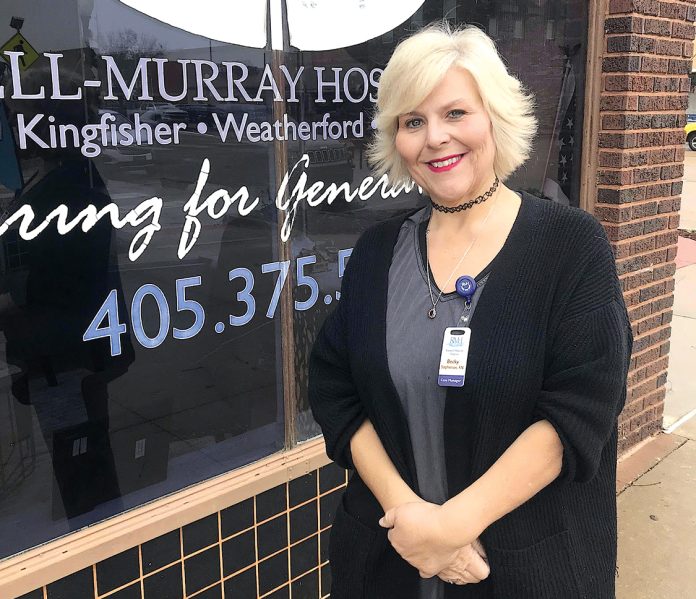
by James Coburn – staff writer
Becky Stephenson always wanted to become a nurse when growing up. But it was her father’s death of cancer at age 46 that sparked her journey.
“I wasn’t a nurse then, but we went through a terrible time. It was hard for my family,” Stephenson said. “And so right then I knew where I was going to belong and that was going to be hospice.”
She was ready to join nursing and hasn’t stopped since. Stephenson, RN, is a case manager at Russell-Murray Hospice, located in Kingfisher. Offices are also in El Reno and Oklahoma City. She is a 2001 nursing school graduate of Oklahoma City Community College and has been with Russell-Murray Hospice for three years. She came to the Kingfisher office in April. (STORY CONTINUES BELOW)
“I get to help people go through the worst time in their life but it’s also such a blessing to be part of that, prepare them to be at a good place and accept death as part of living and be at peace with that,” she said.
Hospice helps patients live their remaining days out of hospitals to be in the comfort of loved ones.
“It’s a great gift to the patient because most patients don’t want to pass away in the hospital,” Stephenson said. “They want to be sitting by their puppy dog and their grandchildren, maybe have one last meal that tastes good to them or see the Christmas tree lights.”
She loves caring for each patient holistically as well as their families. Hospice helps comfort the patient spiritually, mentally and physically. Most of the time it’s the families that struggle with death more than the patient, Stephenson said. Most of the patients become accepting and can tell a nurse what’s going to happen before it does, she added. So, it’s a blessing to be with them and just support them, she said.
“We will just help that patient get their needs met and explain why they’re feeling this way,” Stephenson said.
Stephenson is gentle but direct in answering all of their questions. Every patient is different, but there are things the nursing staff sees repeatedly that indicate the impending process of transitioning beyond this life. Appetites change bringing weight loss as families may try to insist that they eat.
“Sometimes it’s hard for families to accept that,” Stephenson explained. “So, as we go along the steps, we use printed materials along with our nursing skills, and we just sit down with them and pretty much put our arms around them.”
It’s a momentous occasion to gain the trust of a family for Stephenson.
“They are putting their mama in our hands,” she said. “So, we address that with love.”
She is the patient’s advocate to the family by speaking on the patient’s behalf. She explains that loss of appetite is normal and helps prepare them for what to expect.
There are tools she can rely on as a nurse.
Stephenson has a pharmacist to consult with and reach out anytime day or night for palliative care. She can reach out to the physician, nurse practitioner and other staff members.
What I love about these people is we are a family,” she said. “We feel like a family and when we take care of a patient, it’s not one person that has this patient, our team has this patient.”
The team meets together once a week to discuss the best practices for helping their hospice patients. It’s all about alleviating pain and providing comfort.
“We know we’re not going to get our patients well and sometimes the family is not ready to hear that,” she continued. “So, our goal is to help them accept that’s going to be our goal — to keep them out of pain and provide them the tools that they need to live where they live in their house, assisted living or a nursing home. Wherever they reside, we will meet them there.”
Russell-Murray Hospice will even take patients outside their community to visit with family or friends.
“We just put our arms around them and help them as a team,” she said.
Her patients are sometimes friends and acquaintances she has known for many years, even grade school.
“You can’t help pouring your heart into that,” she said.
Compassion is the No. 1 quality of an effective hospice nurse, she said. Patience and the ability to be autonomous are indispensable qualities, she added.
“Sometimes, you might be the only one in that home and they’re looking to you to be that guide,” she exclaimed. “You’re a strong person, and you have to have the right words and the right tools to make them feel comfortable in you and trust you.”












